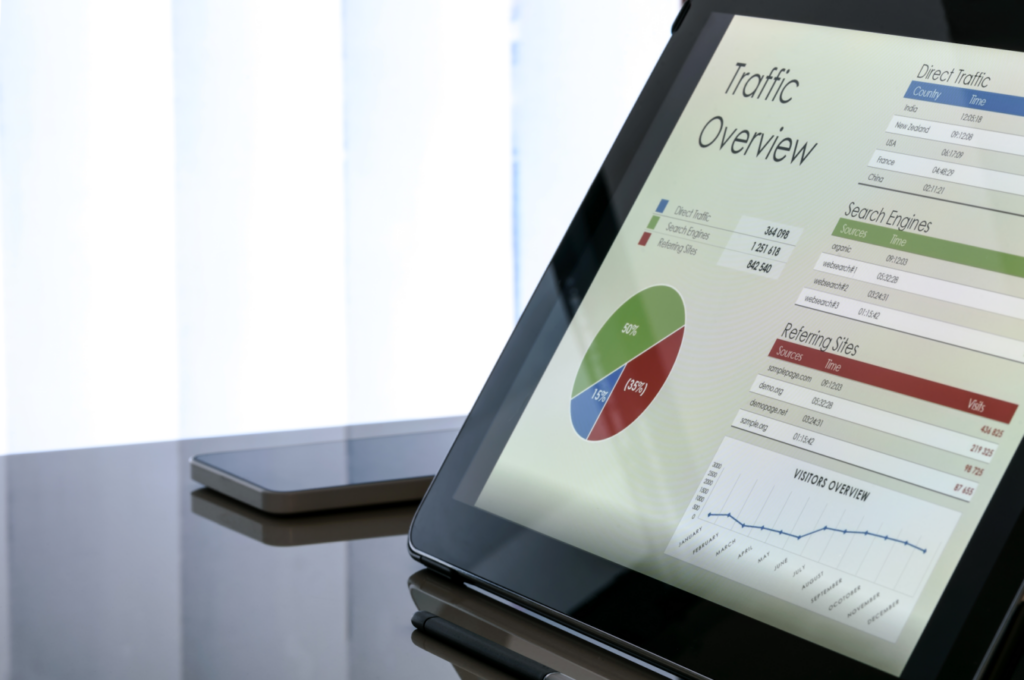Google Analytics is one of the most powerful marketing tools available to businesses today. Even though any mention of the term “analytics” can make many feel overwhelmed, if you’re doing any sort of digital marketing to try and attract new patients to your hearing center, it is important that you become familiar with how to interpret Google Analytics and review them on a regular basis.
Why? Because this data can and should be used to help you make informed business decisions about your future digital marketing campaigns – what you should and shouldn’t be doing next, and what you should be focusing on. Google Analytics allows you to see what visitors are doing on your web site – what content they are interested in and which web pages they are viewing. You can also monitor and analyze where your web site traffic is coming from, including direct and organic traffic, and traffic from social media.
Because Google Analytics contains such a wealth of data, determining what data you should be focusing on the most can be a challenge. The following analytics are considered to be a few of the most important you should be paying attention to:
Sessions
In the Google Analytics world, a session is a series or group of interactions (such as page views, social media interactions, and e-commerce transactions) that occur on your web site by a visitor within a specified date range and time period. By web standards, a session is considered to be over if there is 30 minutes of inactivity on a web site by a user, so if someone has been looking at your web site, steps away for at least 30 minutes, then returns and continues to interact with your web site, a new session begins. Why is this information important? It lets you see if visitors are truly interacting with your web site – because sessions time out, passive visitors to your web site won’t alter the data.
Page Views
The Page Views metric shows the number of times each page on your web site has been viewed within a specified date range. If a visitor navigates to a different page and then returns to the page again, each subsequent page view is counted. This information is useful because it tells you which web pages your visitors are most interested in and which ones aren’t as popular. You want visitors to look at as many pages on your web site as possible and be engaged. Keep in mind that visitors land on certain pages on your web site as a result of organic searches and paid advertising, such as pay-per-click (PPC). You can also use this the Page Views metric to determine which pages you might want to update regularly with new content and include calls-to-action.
Organic Search
Organic search is traffic that comes to your web site from a search engine result (such as Google) vs. a paid ad (PPC) or other referral sources. Google Analytics displays how many visits to your web site were a result of a search that was performed in Google or another browser. Organic search traffic is related to the concept of Search Engine Optimization (SEO), such as utilizing quality keywords in your content. Also referred to as natural search results, this organic search data also serves as an indicator that your web site contains quality content since keywords are driving the traffic to your web site. Google Analytics also lets you view what keywords visitors entered in the search engines to get to your web site – this data can also help you determine if you should be making adjustments to your keywords.
As you can see, there is much more to a web site than how it looks on the outside – quality content that engages visitors and keeps them on your web site is also key.
At JV Innovations (JVI), we carefully analyze the Google Analytics for our client web sites and consider the following when making recommendations for their digital marketing needs:
- Is the web site consistently growing in traffic, especially on the organic side? What keywords are being searched? Do any adjustments to keywords need to be made?
- Which web pages do we want users to land on the most and why? Are visitors engaging with the web site by visiting multiple web pages?
We also stay in close contact with our clients to help them monitor where patients say they learned about the hearing center.
If you would like to learn more about how we can utilize Google Analytics to help you grow your business, please feel free to contact us at [email protected].




